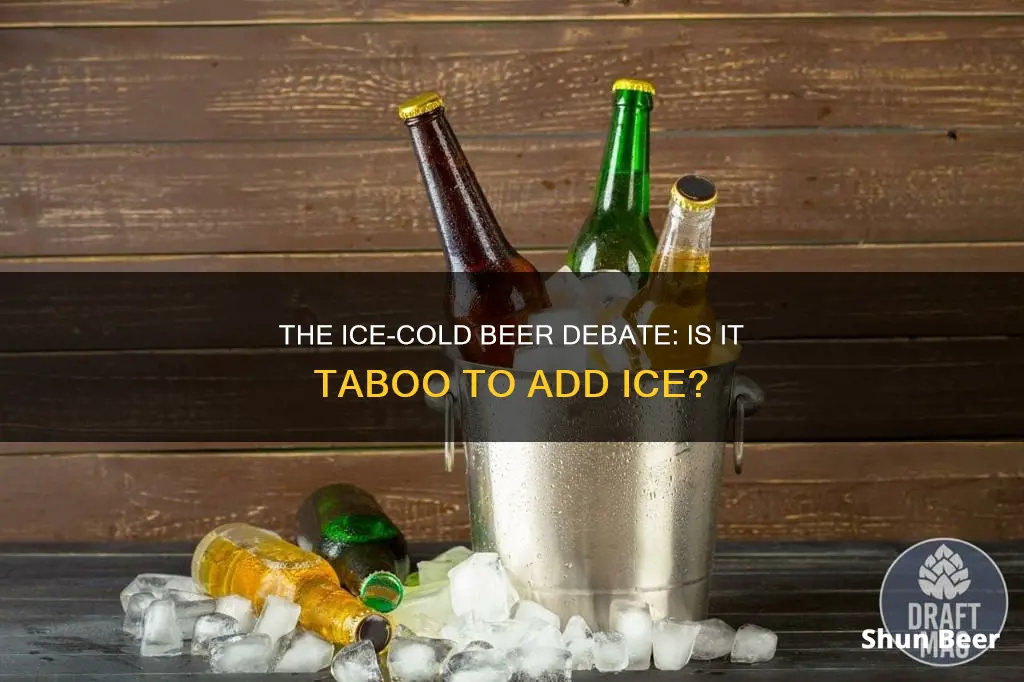
Is it weird to drink beer with ice? The answer depends on who you ask. Some people believe that adding ice to beer is a big no-no as it waters down the drink and dilutes its flavour. Beer is already mostly water, so adding ice changes the intended flavour profile. Others argue that ice is commonly added to other drinks such as Coke, cider, and whiskey, so why not beer? Some people even enjoy beer with ice, especially in hot weather. Ultimately, it comes down to personal preference, and if you like your beer on ice, there's no reason why you shouldn't enjoy it that way.
| Characteristics | Values |
|---|---|
| Taste | Watered down |
| Temperature | Ice cools down the beer |
| Social acceptability | Some people find it weird, others don't mind |
| Tradition | Beer is not supposed to be served with ice |
What You'll Learn

Beer is mostly water, so ice dilutes it
However, other drinks that are mostly water, such as Coca-Cola, are commonly served with ice. In addition, some people argue that ice does not change the alcohol content of the beer, only the volume of the drink.
Despite this, many people still believe that adding ice to beer is unacceptable. They argue that beer is brewed with a certain alcohol-to-water ratio in mind, and that adding ice changes this ratio and negatively affects the flavour.
Some people also argue that beer should not be served ice-cold, as this can numb the drinker's taste buds and hide the flavour of the beer. However, others disagree, and believe that ice-cold beer is refreshing, especially in hot weather.
Ultimately, whether to add ice to beer is a matter of personal preference. While some people may find it unacceptable, others enjoy the refreshing quality of ice-cold beer, and believe that it is no different from adding ice to other water-based drinks.
Beer Consumption and Bladder Cancer: What's the Connection?
You may want to see also

Ice reduces the flavour
Beer is a complex, delicately balanced beverage with a mild flavour. It is mostly water, and its subtle flavour can be easily diluted by adding ice.
The flavour of beer is also dependent on the ratio of alcohol to water. Beer is brewed with a certain alcohol-to-water ratio in mind, as well as the amounts of hops, yeast, and malt. When ice is added, this ratio is altered, and the taste of the beer is no longer as intended.
Additionally, ice can disrupt the formation of a head on the beer, further impacting the flavour and overall drinking experience.
While some people may not mind a watered-down beer, especially in hot weather, it is generally frowned upon by beer enthusiasts to add ice to beer as it destroys the intended flavour and experience of the beer.
If one desires a very cold beer, it is recommended to chill the beer in the freezer for 15-20 minutes or to use a thick-walled glass that has been chilled in the freezer. This way, the beer will be ice-cold without the addition of ice.
Beer and Health: A Daily Drink, Good or Bad?
You may want to see also

It's socially unacceptable to add ice to beer
However, some people do add ice to their beer, particularly in hot climates, and it is common to do so in parts of South America and Southeast Asia. Some people argue that it is acceptable to add ice to beer if that is how you prefer to drink it.
The reasons for not adding ice to beer go back to ancient times. Beer is made from grain, usually barley, that is harvested, roasted, cracked open, boiled, and steeped in water. This process creates "wort", which is then exposed to yeast, which converts the sugars in the wort into alcohol and carbon dioxide, resulting in a lightly alcoholic, fizzy drink. Beer is, therefore, mostly water, and adding ice waters it down, destroying the flavour, texture, and aroma.
If you want a really cold beer, it is better to put the bottle or glass in the freezer for 15-20 minutes before drinking it. However, be careful not to leave it too long, or it will freeze and separate, killing the carbonation. Alternatively, you can put a thick-walled glass in the freezer and then pour your ice-cold beer into it.
Beer and Fluconazole: Is It Safe to Drink?
You may want to see also

Ice is unnecessary if the beer is already cold
Beer is a complex beverage with a delicate balance of flavours. It is mostly water, and adding ice to beer will dilute the flavour, impacting the taste, texture, and aroma of the drink. While some people enjoy the refreshing quality of ice-cold beer, others argue that ice is unnecessary if the beer is already cold.
Beer is best served cold, and ice is not required to achieve the perfect temperature. In fact, adding ice to beer can be counterproductive, as it melts and waters down the drink. This is especially true if the beer is of good quality and has a well-balanced flavour profile. Drinking beer with ice can ruin the intended taste experience, as the ice melts and alters the original balance of ingredients.
Additionally, ice can disrupt the formation of a head on the beer, which is an important part of the drinking experience for many beer enthusiasts. A well-poured beer with a nice head is appreciated by beer lovers, and adding ice can detract from this experience.
Some people argue that drinking beer with ice is acceptable, especially in hot weather. In some cultures, such as in Southeast Asia and Latin America, it is common to drink beer with ice. However, this practice is often frowned upon in other parts of the world, particularly in Europe, Britain, and North America.
Ultimately, the decision to add ice to beer is a matter of personal preference. However, it is worth noting that ice can significantly alter the flavour and texture of the beer, and it may not be the best option if you want to fully appreciate the nuances of a well-crafted brew.
Beer and Smile Direct: What's the Verdict?
You may want to see also

Ice takes up space in the glass, reducing the volume of beer
Beer is a complex, fermented beverage with a delicate balance of ingredients. It is mostly water, but the addition of ice can significantly alter its flavour, texture, and aroma. The ice will melt and dilute the beer, reducing its alcohol content per volume. This can be a problem if you are drinking beer for the sake of drinking beer and not just to get alcohol into your system.
The amount of ice added to the beer will impact the rate at which it melts and how much it waters down the drink. A single large ice cube will melt more slowly than several smaller ones, minimising the dilution of the beer.
The practice of drinking beer with ice is more common in some parts of the world, such as Southeast Asia and Latin America, where it is often warm, and the beer may be of lower quality. In these regions, ice helps to keep the beer cold and makes it more palatable.
Some people argue that ice does not necessarily ruin the beer experience and that it is a matter of personal preference. They may enjoy the extra chill that ice provides, especially during hot weather. Additionally, some drinks, like Coke, club soda, and Bloody Marys, are commonly served with ice, and beer drinkers may wonder why beer should be any different.
However, others maintain that ice disrupts the intended flavour, texture, and aroma of the beer. They believe that the complex flavours and aromas of a good beer are best appreciated when the beer is served at the optimal temperature, which is usually not ice-cold.
Ultimately, the decision to add ice to beer is a matter of personal preference. While it may be frowned upon in some circles, especially among beer enthusiasts, there is no harm in experimenting to find what suits your taste.
Expired Beer: Is It Safe to Drink?
You may want to see also
Frequently asked questions
Beer is mostly water, so adding ice waters it down, killing the flavour, texture and aroma.
If you're drinking a beer that's warm, or you like your beer extra cold, some people think it's fine to add ice. It's also common in some parts of the world, like Southeast Asia and Latin America.
Put your beer in the freezer for 15-20 minutes before drinking it. You can also put a glass in the freezer at the same time, and then pour your beer into that.







